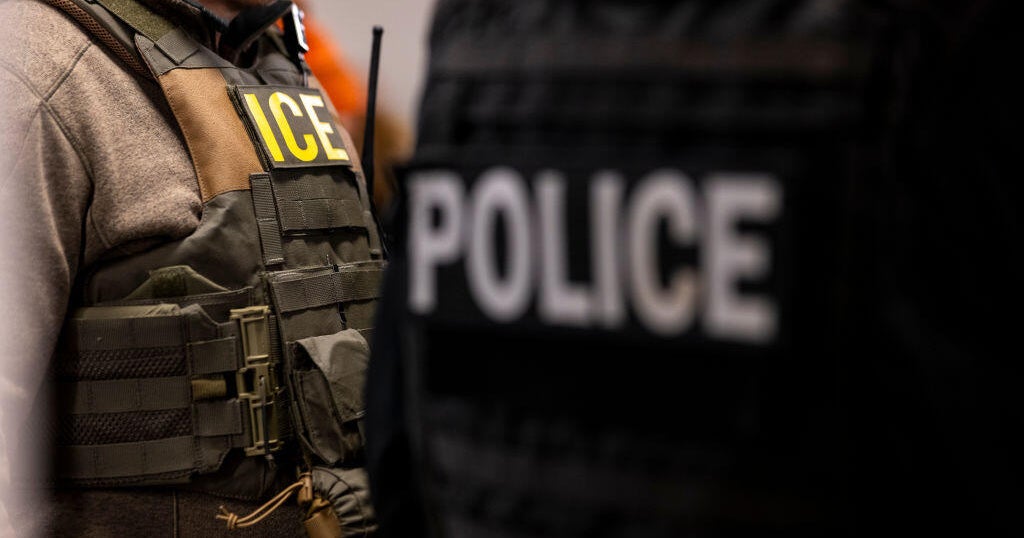/ CBS News
Trump may revive Title 42 policy
Washington — A federal judge in Maryland blocked the Trump administration on Monday from carrying out immigration enforcement actions at certain places of worship for Quakers, Cooperative Baptists and Sikhs, who filed a lawsuit challenging President Trump’s unwinding of a Biden-era memo that barred immigration arrests at certain protected locations.
U.S. District Judge Theodore Chuang granted a request for a narrow preliminary injunction sought by the religious groups as they pursue their challenge to Mr. Trump’s directive allowing federal immigration authorities to conduct enforcement actions at places of worship. Chuang’s order does not block the administration’s policy nationwide, and only applies to houses of worship owned or used by the challengers — the Quakers, the Cooperative Baptist Fellowship and the Sikh Temple.
The groups had argued that the new policy allowing immigration arrests at places that were previously considered protected violates their First Amendment rights and burdens the free exercise of religion under federal law.
Chuang, appointed by President Barack Obama, found that the threat of enforcement action at houses of worship attended by the three religious communities has caused reductions in attendance by not only immigrants who are in the country illegally, but also by those with legal status who fear they may be mistaken for unauthorized immigrants. The court concluded that the new policy from the Trump administration likely violates the faith groups’ rights under the Religious Freedom Restoration Act and the First Amendment.
“Where plaintiffs’ communal religious exercise will be significantly and adversely affected by reductions in attendance resulting from immigration enforcement actions pursuant to the 2025 policy, armed law enforcement officers operating in or at places of worship pursuant to the 2025 policy will adversely affect the ability of Quakers and Sikhs to follow their religious beliefs or worship freely,” Chuang wrote in a 59-page opinion.
The court found that the 2025 policy imposes a substantial burden on the groups’ exercise of religion in relation to their communal worship and the Cooperative Baptists’ immigrant-focused services.
“Immigration enforcement actions at plaintiffs’ places of worship pursuant to the 2025 policy would impose substantial pressure on plaintiffs’ to modify their behavior by preventing them from worshipping with a larger and more diverse group of congregants and thereby inhibiting their exercise of central facets of their respective religions,” Chuang wrote.
He said that because the new directive from the Trump administration has already caused a decline in attendance at communal worship, it “effectively compels” the religious groups to worship with a smaller congregation and with fewer immigrants, “even though their beliefs call for worship with as large and diverse a community as possible.”
“Plaintiffs have thus shown that religious exercise is being hindered by the 2025 policy for entire congregations, including United States citizens and immigrants with legal status, whose ability to worship is undermined by such reduced participation,” Chuang wrote.
The judge ordered the Trump administration to reinstate a 2021 memorandum from then-Homeland Security Secretary Alejandro Mayorkas that barred the department and its components from taking enforcement action in certain places that “require special protection,” including schools, medical facilities or places of worship. That memo said immigration enforcement action should not be undertaken at houses of worship “to the fullest extent possible.”
The court’s order requires the Department of Homeland Security under Mr. Trump to abide by the terms of the 2021 memo when pursuing enforcement actions at the three faith communities’ places of worship.
Chuang’s order does not prevent the Trump administration from conducting arrests in or near places of worship when authorized by a warrant.
Mr. Trump’s directive revoking the Biden administration’s memo was issued on his first day in office as part of a series of executive actions aimed at cracking down on immigration. The Trump administration replaced it with a directive stating that “it is not necessary” to “create bright line rules regarding where our immigration laws are permitted to be enforced.”
A press release from the Department of Homeland Security further stated that “criminals will no longer be able to hide in America’s schools and churches to avoid arrest. The Trump administration will not tie the hands of our brave law enforcement, and instead trusts them to use common sense.”
The Quakers are comprised of six different meetings of the Religious Society of Friends. The Religious Society of Friends has practiced the Quaker faith in the U.S. since the 1600s, and “yearly meetings” are its highest organizational bodies. The group has argued that the communal aspect of its worship is key to the exercise of the Quaker faith.
The Cooperative Baptist Fellowship is a network of churches, worshippers and partners that includes more than 1,400 congregations. Its congregations operate in 37 states, the District of Columbia and Puerto Rico. Many congregations have a large number of immigrants as members, according to court filings, and some of the Cooperative Baptist Fellowship’s congregations are engaged in ministry focused on immigrants and refugees.
The Sikh Temple is a place of worship for the Sikh population near Sacramento, California, which is made up of roughly 30,000 people. Roughly half of its congregation consist of immigrants, according to court papers.
Melissa Quinn is a politics reporter for CBSNews.com. She has written for outlets including the Washington Examiner, Daily Signal and Alexandria Times. Melissa covers U.S. politics, with a focus on the Supreme Court and federal courts.


